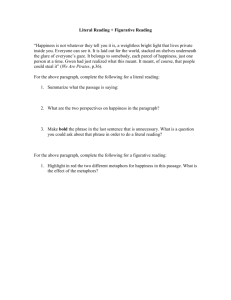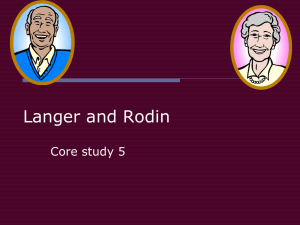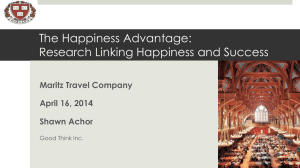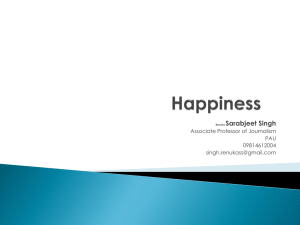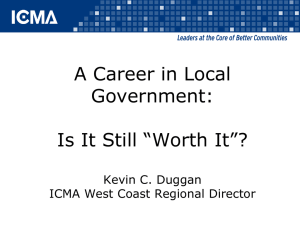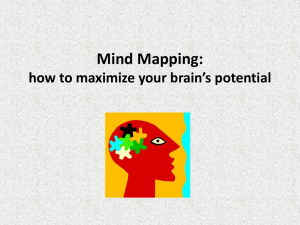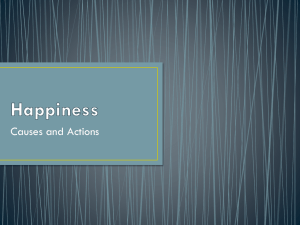Syllabus
advertisement
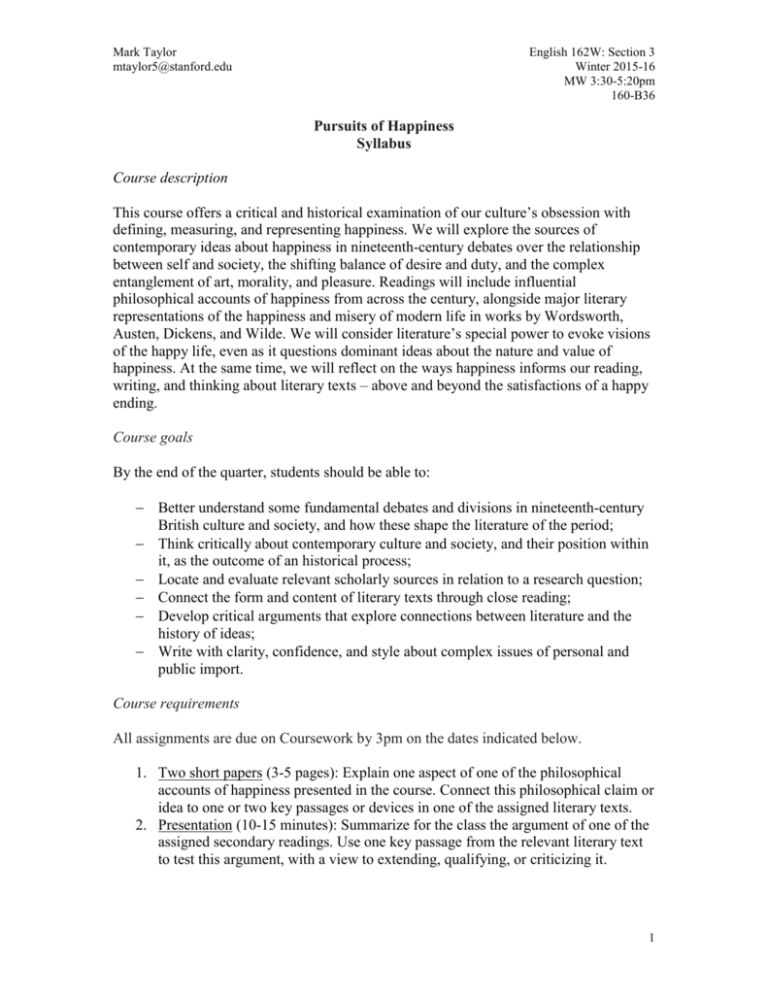
Mark Taylor mtaylor5@stanford.edu English 162W: Section 3 Winter 2015-16 MW 3:30-5:20pm 160-B36 Pursuits of Happiness Syllabus Course description This course offers a critical and historical examination of our culture’s obsession with defining, measuring, and representing happiness. We will explore the sources of contemporary ideas about happiness in nineteenth-century debates over the relationship between self and society, the shifting balance of desire and duty, and the complex entanglement of art, morality, and pleasure. Readings will include influential philosophical accounts of happiness from across the century, alongside major literary representations of the happiness and misery of modern life in works by Wordsworth, Austen, Dickens, and Wilde. We will consider literature’s special power to evoke visions of the happy life, even as it questions dominant ideas about the nature and value of happiness. At the same time, we will reflect on the ways happiness informs our reading, writing, and thinking about literary texts – above and beyond the satisfactions of a happy ending. Course goals By the end of the quarter, students should be able to: Better understand some fundamental debates and divisions in nineteenth-century British culture and society, and how these shape the literature of the period; Think critically about contemporary culture and society, and their position within it, as the outcome of an historical process; Locate and evaluate relevant scholarly sources in relation to a research question; Connect the form and content of literary texts through close reading; Develop critical arguments that explore connections between literature and the history of ideas; Write with clarity, confidence, and style about complex issues of personal and public import. Course requirements All assignments are due on Coursework by 3pm on the dates indicated below. 1. Two short papers (3-5 pages): Explain one aspect of one of the philosophical accounts of happiness presented in the course. Connect this philosophical claim or idea to one or two key passages or devices in one of the assigned literary texts. 2. Presentation (10-15 minutes): Summarize for the class the argument of one of the assigned secondary readings. Use one key passage from the relevant literary text to test this argument, with a view to extending, qualifying, or criticizing it. 1 Mark Taylor mtaylor5@stanford.edu English 162W: Section 3 Winter 2015-16 MW 3:30-5:20pm 160-B36 3. Long paper (12-15 pages): Develop and defend an argument about happiness that shows engagement with both literary and philosophical materials. With the following preparation: a. Proposal (1-2 pages). b. Outline (1-2 pages) c. Annotated bibliography (at least 5 key sources). d. Partial draft (5-10 pages) to be workshopped in class. Detailed assignment sheets for all of the above will be distributed in class. Grades Your grade for the course will be determined according to the following breakdown: Participation and attendance – 10% Short papers – 30% (15% each) Presentation – 10% Long paper preparation and revision – 20% Long paper – 30% Required texts Primary texts (available at the Stanford Bookstore, except Kant, Pater, and Wordsworth): 1. Jane Austen, Sense and Sensibility, ISBN 9780199535576 2. Charles Dickens, Hard Times, ISBN 9780199536276 3. Immanuel Kant, Critique of the Power of Judgment [on Coursework] 4. John Stuart Mill, Autobiography, ISBN 9780140433166 5. Walter Pater, Studies in the History of the Renaissance [on Coursework] 6. Oscar Wilde, The Picture of Dorian Gray, ISBN 9780199535989 7. William Wordsworth, The Prelude [on Coursework] Secondary texts (available on Coursework): 1. Sara Ahmed, “Why Happiness, Why Now?” from The Promise of Happiness 2. Catherine Gallagher, “Hard Times and the Somaeconomics of the Early Victorians,” from The Body Economic 3. Geoffrey H. Hartman, “A Poet’s Progress: Wordsworth and the Via Naturaliter Negativa” 4. Jeff Nunokawa, “The Importance of Being Bored: The Dividends of Ennui in The Picture of Dorian Gray” 5. Mary Poovey, “Ideological Contradictions and the Consolations of Form: The Case of Jane Austen,” from The Proper Lady and the Woman Writer Recommended resources For MLA documentation and formatting, consult MLA Handbook for Writers of Research 2 Mark Taylor mtaylor5@stanford.edu English 162W: Section 3 Winter 2015-16 MW 3:30-5:20pm 160-B36 Papers, 7th edition (2009) and the Purdue OWL website (https://owl.english.purdue.edu/owl/). For general guidance on planning and carrying out a research paper, see Wayne C. Booth et. al, The Craft of Research, 3rd edition (2008) – available online through Searchworks. Students with documented disabilities Students who may need an academic accommodation based on the impact of a disability must initiate the request with the Office of Accessible Education (OAE). Professional staff will evaluate the request with required documentation, recommend reasonable accommodations, and prepare an Accommodation Letter for faculty dated in the current quarter in which the request is being made. Students should contact the OAE as soon as possible since timely notice is needed to coordinate accommodations. OAE contact information: 563 Salvatierra Walk 650-723-1066 http://studentaffairs.stanford.edu/oae Honor Code The Honor Code is the University’s statement on academic integrity written by students in 1921. It articulates University expectations of students and faculty in establishing and maintaining the highest standards in academic work: The Honor Code is an undertaking of the students, individually and collectively: 1. that they will not give or receive aid in examinations; that they will not give or receive unpermitted aid in class work, in the preparation of reports, or in any other work that is to be used by the instructor as the basis of grading; 2. that they will do their share and take an active part in seeing to it that others as well as themselves uphold the spirit and letter of the Honor Code. The faculty on its part manifests its confidence in the honor of its students by refraining from proctoring examinations and from taking unusual and unreasonable precautions to prevent the forms of dishonesty mentioned above. The faculty will also avoid, as far as practicable, academic procedures that create temptations to violate the Honor Code. While the faculty alone has the right and obligation to set academic requirements, the students and faculty will work together to establish optimal conditions for honorable academic work. 3 Mark Taylor mtaylor5@stanford.edu English 162W: Section 3 Winter 2015-16 MW 3:30-5:20pm 160-B36 Class schedule Introduction: Happiness Today Week 1 Monday, January 4 Bring in an example of a “happiness measure” from popular culture Read Ahmed, “Why Happiness, Why Now?” (optional) Wednesday, January 6 Read selections from Critique of the Power of Judgment “Bliss it was that dawn”: Romantic Happiness Week 2 Monday, January 11 Read Prelude, bks I and VI Wednesday, January 13 Read Hartman, “A Poet’s Progress” Week 3 **Monday, January 18 - Martin Luther King Day, no class** Wednesday, January 20 Read Sense and Sensibility, vol. I Week 4 Monday, January 25 Read Sense and Sensibility, vol. II, to ch. 8. Wednesday, January 27 Finish Sense and Sensibility, vol. II 4 Mark Taylor mtaylor5@stanford.edu English 162W: Section 3 Winter 2015-16 MW 3:30-5:20pm 160-B36 Short paper 1 due Week 5 Monday, February 1 Sense and Sensibility, vol. III Read Poovey, “Ideological Contradictions” Wednesday, February 3 Finish Sense and Sensibility Happiness by Numbers: Realism and Utilitarianism Week 6 Monday, February 8 Read Autobiography, ch. 1-3 Wednesday, February 10 Read Autobiography, ch. 4 and 5 Research proposal due Week 7 **Monday, February 15 – Presidents’ Day, no class** Wednesday, February 17 Read Hard Times, bks I and II Short paper 2 due Week 8 Monday, February 22 Read Hard Times, bk III Wednesday, February 24 Read Gallagher, “Somaeconomics” 5 Mark Taylor mtaylor5@stanford.edu English 162W: Section 3 Winter 2015-16 MW 3:30-5:20pm 160-B36 Annotated bibliography and outline due “Nature’s test”: Decadence and Aestheticism Week 9 Monday, February 29 Read extracts from Studies in the History of the Renaissance, and The Picture of Dorian Gray to ch. 11. Wednesday, March 2 Finish The Picture of Dorian Gray Partial draft due Week 10 Monday, March 7 Read Nunokawa, “The Importance of Being Bored” Wednesday, March 9 Conclusion and review **Long paper due: Friday, March 11, by 5pm** 6
